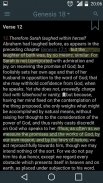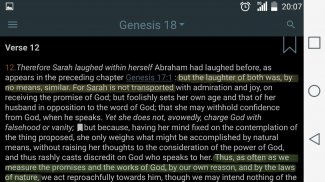













Calvin's Bible Commentaries

Descripción de Calvin's Bible Commentaries
John Calvin's Commentaries on the Bible
If You liked this book you can find version without advertisement in my applications: "Calvin Bible Commentary Pro"
A classic commentary on the Old and New Testaments, complete and unabridged. Written in a clear, lucid style, it combines a profound reverence for the Bible with a rare objectivity in its exegesis.
One of the most influential bible scholars of all time, John Calvin, although controversial, is a force to be reckoned with. His commentaries reflect an incredible command of the Scriptures, as he sought to integrate the entirety of its teaching by combining a solid exegetical method with a pastoral insight that is often neglected in commentaries today.
Calvin strikes a balance between passion and restraint, often infusing his writing with a distinct quality of controlled intensity. Scholars now recognize Calvin as above all else a teacher. He sought to open the Word of God in scripture to the common people from whom, he believed, the Bible had been withheld by the scholastics, monks and priests of the Roman church. By recapturing scripture's simple, genuine and natural sense, Calvin returned scripture to its rightful place in the church. His sole object as a teacher was "to lay down a pathway to the reading of sacred Scripture for the simple and uneducated."
John Calvin (Middle French: Jean Cauvin; 10 July 1509 -- 27 May 1564) was an influential French theologian and pastor during the Protestant Reformation. He was a principal figure in the development of the system of Christian theology later called Calvinism. Originally trained as a humanist lawyer, he broke from the Roman Catholic Church around 1530. After religious tensions provoked a violent uprising against Protestants in France, Calvin fled to Basel, Switzerland, where in 1536 he published the first edition of his seminal work Institutes of the Christian Religion.
Calvin was a tireless polemic and apologetic writer who generated much controversy. He also exchanged cordial and supportive letters with many reformers including Philipp Melanchthon and Heinrich Bullinger. In addition to the Institutes, he wrote commentaries on most books of the Bible as well as theological treatises and confessional documents, and he regularly gave sermons throughout the week in Geneva. Calvin was influenced by the Augustinian tradition, which led him to expound the doctrine of predestination and the absolute sovereignty of God in salvation.
Calvin's writing and preachings provided the seeds for the branch of theology that bears his name. The Presbyterian and other Reformed churches, which look to Calvin as a chief expositor of their beliefs, have spread throughout the world. Calvin's thought exerted considerable influence over major religious figures and entire religious movements, such as Puritanism, and some political historians have argued that his ideas have contributed to the rise of capitalism, individualism, and representative democracy in the West.Comentarios de Juan Calvino sobre la Biblia
Si te gustó este libro se puede encontrar la versión sin publicidad en mis aplicaciones: "Calvin Comentario de la Biblia Pro"
Un comentario clásico sobre el Antiguo y Nuevo Testamento, completo e íntegro. Escrito en un estilo lúcido claro, combina una profunda reverencia por la Biblia con una objetividad poco común en su exégesis.
Uno de los más influyentes estudiosos de la Biblia de todos los tiempos, John Calvin, aunque controversial, es una fuerza a tener en cuenta. Sus comentarios reflejan un increíble dominio de las Escrituras, como él trató de integrar la totalidad de la enseñanza mediante la combinación de un método exegético sólido con una visión pastoral que a menudo se descuida en los comentarios hoy.
Calvin consigue un equilibrio entre la pasión y la moderación, a menudo infundiendo su escritura con una calidad distinta de intensidad controlada. Los estudiosos reconocen ahora Calvin como por encima de todo un maestro. Trató de abrir la Palabra de Dios en las Escrituras a la gente común de la que, a su juicio, la Biblia había sido retenido por los escolásticos, monjes y sacerdotes de la iglesia romana. Por recapturar el sentido simple, auténtica y natural de la escritura, escritura Calvin volvió a su lugar legítimo en la iglesia. Su único objetivo como profesor era "establecer un camino hacia la lectura de la Sagrada Escritura, por la simple y sin educación."
Juan Calvino (francés medio: Jean Cauvin; desde julio 10, 1509 hasta 05 27, 1564) fue un teólogo francés influyente y pastor durante la Reforma protestante. Él era una figura principal en el desarrollo del sistema de la teología cristiana posterior llamado calvinismo. Originalmente formado como abogado humanista, que se separó de la Iglesia Católica Romana en torno a 1530. Después de las tensiones religiosas provocaron un levantamiento violento contra los protestantes en Francia, Calvin huyó a Basilea, Suiza, donde en 1536 se publicó la primera edición de su obra seminal Institutos de la religión cristiana.
Calvino fue un escritor polémico y apologético incansable que generó mucha polémica. También intercambió cartas cordiales y de apoyo con muchos reformadores incluyendo Philipp Melanchthon y Heinrich Bullinger. Además de los Institutos, que escribió comentarios sobre la mayoría de los libros de la Biblia, así como tratados teológicos y documentos confesionales, y él dio regularmente sermones durante toda la semana en Ginebra. Calvino fue influenciado por la tradición agustiniana, que le llevó a exponer la doctrina de la predestinación y la soberanía absoluta de Dios en la salvación.
Escrito y predicaciones de Calvino siempre que las semillas para la rama de la teología que lleva su nombre. Las iglesias presbiterianas y reformadas otros, que se ven a Calvino como jefe expositor de sus creencias, se han extendido por todo el mundo. Pensamiento de Calvino ejerció considerable influencia sobre las principales figuras religiosas y movimientos religiosos enteros, como el puritanismo, y algunos historiadores políticos han argumentado que sus ideas han contribuido al surgimiento del capitalismo, el individualismo y la democracia representativa en el Oeste.
























